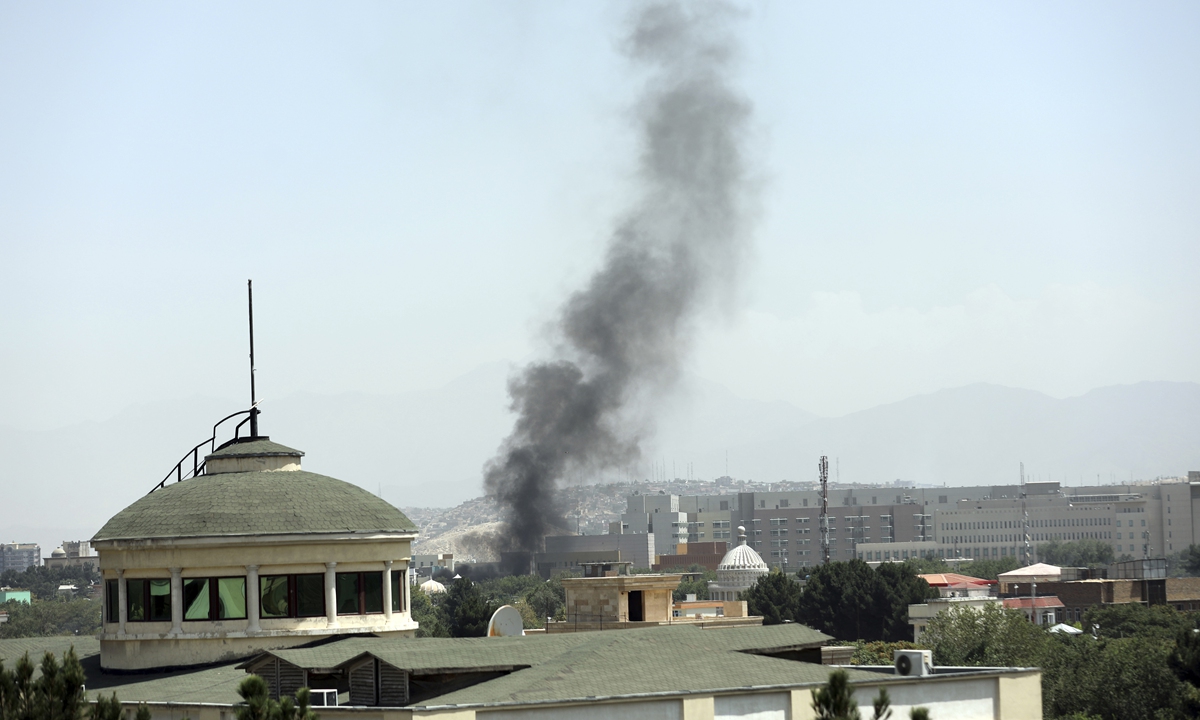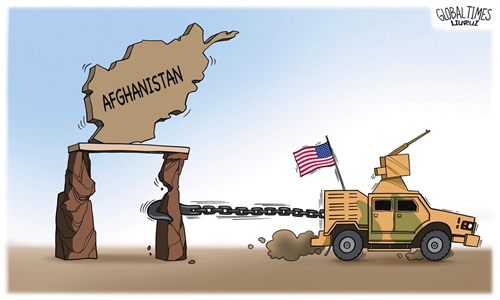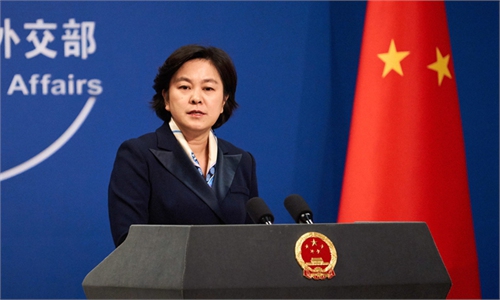
Smoke rises next to the US Embassy in Kabul, Afghanistan on August 15. Photo: VCG
When US President Joe Biden defended the "drawdown of US forces in Afghanistan" in July, he articulated that Washington needs to "focus on shoring up America's core strengths to meet the strategic competition with China and other nations," among other reasons. Only one month later, the Taliban's stunningly swift takeover of Afghanistan has shown the world that US competence in dominating major power games is crumbling.When the US invaded Afghanistan, its goal was not only eliminating terrorism, but also realizing control over Central and Western Asia, even the entire Eurasia, through Afghanistan and Iraq, as an attempt to contain China and Russia.
After witnessing that the US had gained nothing from $2 trillion and over 2,000 military casualties in Afghanistan, Washington has been mulling to walk away for years. On the face of it, Biden showed a gesture to right the wrong in the Middle East, but his bigger intention is to focus on China, pooling as many US military forces as possible into the Indo-Pacific region. The grand strategy seemed flawless and inspiring for Washington, until the US' epic defeat and chaotic retreat in Afghanistan mirrored how shaky it is.
US calculation to restrain China and Russia through Afghanistan has failed. And more importantly, will US military forces in the Middle East be efficiently turned into deterrence against China? Washington would be naïve to believe so. The current US deployment in the Asia-Pacific region is insignificant to China, whose comprehensive strength is ever-growing, Lü Xiang, a research fellow at the Chinese Academy of Social Sciences in Beijing, told the Global Times on Monday. "A little bit more troops, relocated from Afghanistan to China's periphery, do not make much difference for China," Lü said.
In addition, the US just displayed it is no longer as almighty as it believes to be in major power games. According to media reports and online video clips, the capacity of the Afghan Taliban's military is quite limited, with insufficient and outdated machine guns, mortar shells and other ammunition supplies. But it still wins in the country. When US helicopters flew over the US embassy in Kabul, evacuating American diplomats, quite a few observers sighed it was a "Saigon moment" all over again.
The truth is, this is even worse than the Saigon moment. No major power was behind the Afghan Taliban, but the US lost anyway. The US calls the move a drawdown. It is, in the truest sense, a meltdown.
The drastic change in Afghanistan's situation has taught the world a lesson: The US may be able to wage a war against small and medium-sized countries, but it cannot win a war anymore, Lü said, stressing that the country failed to reach any of its political goals in either Iraq or Afghanistan. The point is, if the US cannot even secure a victory in a rivalry with small countries, how much better could it do in a major power game with China?
Since Biden assumed office, Washington has shown its strong need for allies to gang up on Beijing. But after the US stumbled in Afghanistan, how many allies will keep faith in US strength? Not to mention it will be considerably more difficult for the US to convince the swing countries, like those in Southeast Asia, to join hands with the US in forging a broad anti-China camp.
The US will not provoke a face-to-face military conflict with China, because Chinese military can launch a far greater counterattack than any of the small and medium-sized countries. Overly promoting the competition with China in other areas will also lead to more costs for the US with no gains, as the US is losing its "core strengths" to "meet the strategic competition" with China, not to mention shoring them up.
The US should be neither underestimated nor overestimated. Signals can be captured from the US' ugly withdrawal from Afghanistan - the US spent a lot of time studying how to contain China and Russia, but in the end suffered a huge failure in Afghanistan. The result not only runs counter to the US desire, but also exposed loopholes in the US' half-witted foreign policy design.



